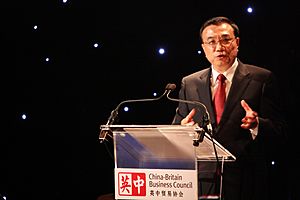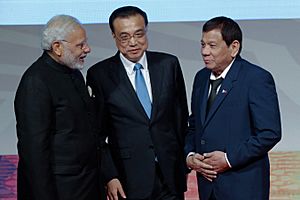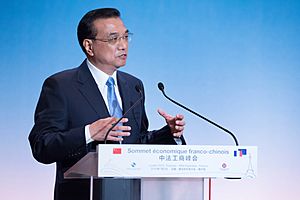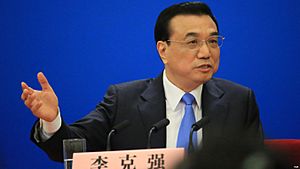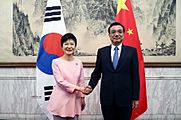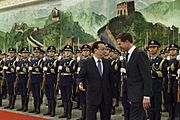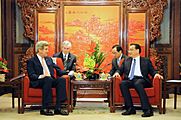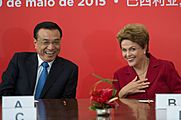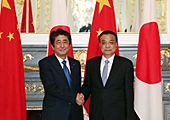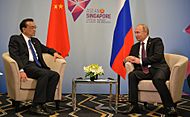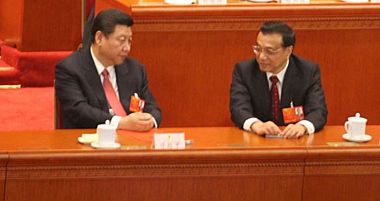Li Keqiang facts for kids
Quick facts for kids
Li Keqiang
|
|||||||||||||||||||
|---|---|---|---|---|---|---|---|---|---|---|---|---|---|---|---|---|---|---|---|
|
李克强
|
|||||||||||||||||||
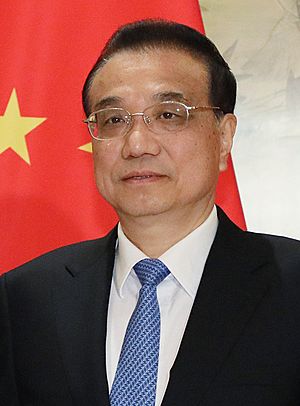
Li in 2019
|
|||||||||||||||||||
| 7th Premier of the People's Republic of China | |||||||||||||||||||
| In office 15 March 2013 – 11 March 2023 |
|||||||||||||||||||
| President | Xi Jinping | ||||||||||||||||||
| Vice Premier |
Cabinet I
(2013–2018) Cabinet II
(2018–2023) |
||||||||||||||||||
| Preceded by | Wen Jiabao | ||||||||||||||||||
| Succeeded by | Li Qiang | ||||||||||||||||||
| First Vice Premier of the People's Republic of China | |||||||||||||||||||
| In office 17 March 2008 – 15 March 2013 |
|||||||||||||||||||
| Premier | Wen Jiabao | ||||||||||||||||||
| Preceded by | Wu Yi (acting) | ||||||||||||||||||
| Succeeded by | Zhang Gaoli | ||||||||||||||||||
| Communist Party Secretary of Liaoning | |||||||||||||||||||
| In office 13 December 2004 – 29 October 2007 |
|||||||||||||||||||
| Governor | Zhang Wenyue | ||||||||||||||||||
| Preceded by | Wen Shizhen | ||||||||||||||||||
| Succeeded by | Zhang Wenyue | ||||||||||||||||||
| Communist Party Secretary of Henan | |||||||||||||||||||
| In office 30 December 2002 – 13 December 2004 |
|||||||||||||||||||
| Governor | Li Chengyu | ||||||||||||||||||
| Preceded by | Chen Kuiyuan | ||||||||||||||||||
| Succeeded by | Xu Guangchun | ||||||||||||||||||
| First Secretary of the Communist Youth League of China | |||||||||||||||||||
| In office 10 May 1993 – 23 June 1998 |
|||||||||||||||||||
| Preceded by | Song Defu | ||||||||||||||||||
| Succeeded by | Zhou Qiang | ||||||||||||||||||
| Personal details | |||||||||||||||||||
| Born | 3 July 1955 Hefei, Anhui, China |
||||||||||||||||||
| Died | 27 October 2023 (aged 68) Shanghai, China |
||||||||||||||||||
| Political party | CCP (from 1974) | ||||||||||||||||||
| Spouse |
Cheng Hong
(m. 1983) |
||||||||||||||||||
| Children | 1 daughter | ||||||||||||||||||
| Alma mater | Peking University (LLB, MEc, PhD) | ||||||||||||||||||
| Cabinet | Li Keqiang Government | ||||||||||||||||||
| Signature |  |
||||||||||||||||||
| Scientific career | |||||||||||||||||||
| Fields | Economics | ||||||||||||||||||
| Thesis | On the ternary structure of Chinese economy (1991) | ||||||||||||||||||
| Doctoral advisor | Li Yining | ||||||||||||||||||
|
Central institution membership
2007–2022: 17th, 18th, 19th Politburo Standing Committee
2007–2022: 17th, 18th, 19th Politburo 1997–2022: Full member, 15th, 16th, 17th, 18th, 19th Central Committee 1993–1998: Delegate, 8th National People's Congress Leading group posts
2020–2022: Leader, leading group on the prevention and control of the novel Coronavirus pandemic
2014–2023: Deputy Leader, Leading Group for Internet Security and Informatization 2013–2023: Deputy Leader, Leading Group for Financial and Economic Affairs 2013–2022: Deputy Leader, Central Leading Group for Comprehensively Deepening Reforms 2013–2023: Leader, Leading Group for Climate Change and Emissions Reduction 2013–2023: Leader, State Council Leading Party Members Group 2008–2013: Leader, Leading Group for Health Care Reform 2008–2013: Leader, Leading Group for Coordinating the South-North Water Transfer Project 2008–2013: Leader, Leading Group for Coordinating the Three Gorges Dam Project Other offices held
2013–2023: Vice Chairman, National Security Commission
2013–2023: Chairman, State Commission for Public Sector Reform 2013–2023: Chairman, National Defense Mobilization Commission 2013–2023: Chairman, National Energy Commission 2013–2023: Chairman, Central Institutional Organization Commission 2005–2007: Chairman, Liaoning Provincial People's Congress 2003–2004: Chairman, Henan Provincial People's Congress 1999–2003: Governor of Henan 1998–2003: Director of the Yellow River Flood Response Headquarters 1993–1998: Principal of the Chinese Youth Political Academy 1982–1983: Communist Youth League Secretary, Peking University |
|||||||||||||||||||
| Chinese name | |||||||||||||||||||
| Simplified Chinese | 李克强 | ||||||||||||||||||
| Traditional Chinese | 李克強 | ||||||||||||||||||
|
|||||||||||||||||||
Li Keqiang (Chinese: 李克强; pinyin: Lǐ Kèqiáng; 3 July 1955 – 27 October 2023) was an important Chinese politician and economist. He served as the premier of the People's Republic of China from 2013 to 2023. The premier is like the head of government, overseeing the country's daily operations.
Li was also a top leader in the Politburo Standing Committee of the Chinese Communist Party (CCP) from 2012 to 2022. He was part of a group of leaders known as the "fifth generation of Chinese leadership", alongside Xi Jinping.
Born in Hefei, China, in 1955, Li started his political career in the Communist Youth League of China (CYLC). He led the CYLC from 1993 to 1998. Later, he served as a provincial leader in Henan (1998–2004) and Liaoning (2004–2007).
From 2008 to 2013, Li was the first-ranked vice premier under Premier Wen Jiabao. In this role, he helped manage China's economic development, finances, and efforts against climate change.
When he became premier in 2013, Li helped shift China's focus from selling goods to other countries (export-led growth) to encouraging people within China to buy more goods. He was a key figure in China's economic and security policies. Li was known for supporting reforms and a more practical approach to leadership. He passed away in October 2023, a few months after leaving his role as premier.
Contents
Early Life and Education
Li Keqiang was born on 3 July 1955, in Hefei, Anhui province. His father was a local government official. After finishing high school in 1974, during a time called the Cultural Revolution, Li worked on a farm in Fengyang County, Anhui.
He joined the Chinese Communist Party (CCP) in 1976. He was recognized for his hard work and studies during this time.
Li decided to go to Peking University Law School in 1978. He became the president of the university's student council. He studied law and helped translate important legal books from English into Chinese. He earned his law degree in 1982.
In 1982, Li became the leader of the Communist Youth League of China (CYLC) at Peking University. He then moved up to the national leadership of the CYLC in 1983. There, he worked closely with Hu Jintao, who later became China's top leader.
Li returned to Peking University for more studies in 1988. He studied economics under a famous economist, Li Yining. He earned his Master's and PhD degrees in Economics from Peking University in 1995. His PhD paper, "On the ternary structure of Chinese economy", won China's highest award in economics in 1996.
Li became the top leader of the CYLC in 1993 and served until 1998. During his time, he started the Youth Volunteers Operation, which encouraged young people to volunteer for educational, social, and environmental projects. In 1997, he became a full member of the CCP Central Committee, a very important group in the Party.
Provincial Leadership Roles
Leading Henan Province (1998–2004)
In June 1998, Li became the youngest Chinese provincial governor at 43 years old. He was appointed governor of Henan province. People who worked with him said he avoided big, fancy events that weren't related to government work.
Li was known for being direct and for helping economic development in Henan. He worked to make the province more attractive for investments. He traveled across the province to find solutions to its problems. In 2002, he became Henan's top political leader, the Communist Party secretary. When he left Henan in 2004, the province's economic ranking had greatly improved.
Leading Liaoning Province (2004–2007)
In December 2004, Li moved to become the Party secretary of Liaoning province. There, he started a project called "Five Points and One Line". This project connected several ports like Dalian and Dandong to improve trade.
During his time in Liaoning, Li developed the "Li Keqiang index". This was a special way to measure the economy. Instead of just looking at official economic numbers, which could sometimes be misleading, he used things like railway cargo volume, electricity use, and bank loans to get a clearer picture of economic health.
Serving as Vice Premier (2008–2013)
Li joined the CCP Politburo Standing Committee in October 2007. This is one of the most powerful groups in China. In 2008, he was chosen as the first-ranking vice premier. This meant he was being prepared to become the next premier.
As vice premier, Li was in charge of many important areas. These included economic development, government money, land, the environment, and health. He also led groups dealing with major projects like the Three Gorges Dam and the South–North Water Transfer Project. He helped Premier Wen Jiabao with issues like climate change and energy.
Li played a key role in China's economic stimulus program in 2008. This program helped the economy recover after the 2008 Sichuan earthquake and the global financial crisis. In 2010, he spoke at the World Economic Forum in Davos, Switzerland. He shared China's plans for sustainable development, green energy, and reducing income inequality. He also warned against countries putting up trade barriers.
In February 2010, Li gave a speech about changing China's economic structure. He said China needed to focus more on people buying goods within the country (domestic consumption). He also stressed the importance of continued growth of cities (urbanization) and modernizing farming.
Becoming Premier (2013–2023)
Li became the second most powerful person in the Politburo Standing Committee in late 2012. On 15 March 2013, the 12th National People's Congress officially elected Li Keqiang as premier. He took over from Wen Jiabao. At the same time, Xi Jinping was elected President.
After becoming premier, Li gave a speech calling for careful spending by the government, fairer income distribution, and continued economic reforms. He wanted China to rely more on its own people buying goods rather than just exporting them. In 2013, Forbes magazine ranked him as the 14th most powerful person in the world. He was reappointed as premier in March 2018.
Economic Plans
Li believed in using good economic information to make government decisions. When he first became premier, China faced challenges like too much debt from big projects and a growing gap between rich and poor. Li's approach to the economy was called "Likonomics". It focused on reducing debt, ending huge government spending programs, and making big changes to the economy.
However, by 2014, global economic problems slowed China's growth. Li's government responded by cutting taxes for small businesses, improving poor urban areas, and building more railways, especially in inland parts of the country.
Li was a key figure in implementing reforms announced in 2013. These reforms aimed to let market forces play a "decisive" role in how resources were used, meaning less government control over the economy. Li often criticized local governments for not following these reform plans properly.
Domestic Policies
Li often spoke out against unnecessary government paperwork and bureaucracy. He believed that many local officials were not serving the public well. He shared funny, but true, stories about ridiculous requests from government offices. For example, a citizen was asked to prove their mother was their mother, or a one-year-old needed proof of no criminal record. Li called these situations "absolutely preposterous" and said they were "not a joke, it's all real!"
From January 2020, Li was in charge of China's response to the COVID-19 pandemic. He visited Wuhan, where the pandemic first started, to lead the efforts to control the outbreak.
International Relations
Li Keqiang's first foreign visit as premier was to India in May 2013. This showed how important China considered its relationship with India. He aimed to solve border issues and boost economic ties. In 2015, he even took a selfie with Indian Prime Minister Narendra Modi.
During a visit to Pakistan, Li said that China wanted to help Pakistan as much as possible, calling Pakistan China's "closest friend and brother". He also visited Switzerland and Germany on his first trip to Europe.
-
June 2013, Li meets the South Korean president Park Geun-hye.
-
December 2013, Li meets the Dutch prime minister Mark Rutte.
-
February 2014, Li meets the United States Secretary of State John Kerry.
-
May 2015, Li meets the Brazilian president Dilma Rousseff.
-
May 2018, Li meets the Japanese prime minister Shinzo Abe.
-
November 2018, Li meets the Russian president Vladimir Putin.
Relationship with Xi Jinping
Some people thought that Li Keqiang's power might have been reduced as President Xi Jinping gained more control. There was talk that Li was becoming a "weakest premier" since 1949.
After major reforms were announced in 2013, it seemed that President Xi Jinping was leading these changes more directly. This was different from how things were done before, leading to ideas that Li's role might be getting smaller. However, Li was still named as Vice Chairman of the National Security Commission and deputy leader of other important groups.
After Being Premier (2023)
On 11 March 2022, Li confirmed he would step down as premier in March 2023. His term officially ended on 11 March 2023, and Li Qiang, a close ally of Xi, became the new premier. During his farewell speech, Li Keqiang reportedly said, "While people work, heaven watches. Heaven has eyes."
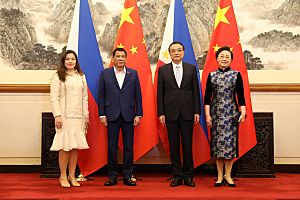
Death of Li Keqiang
Li Keqiang passed away in Shanghai on 27 October 2023, at the age of 68. He died after suffering a heart attack the day before. Reports suggested the heart attack happened while he was swimming.
His body was flown to Beijing on 27 October. On 2 November, a memorial service was held at the Babaoshan Revolutionary Cemetery, and he was cremated. Many important leaders attended, including Xi Jinping and his wife, the new Premier Li Qiang, and other top officials. National flags were flown at half-mast in China and at Chinese offices around the world to show respect.
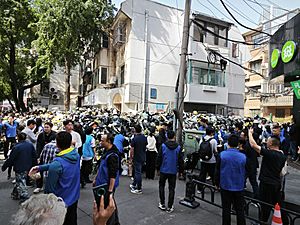
Personal Life
Li was married to Cheng Hong, who is a professor of English literature. His father-in-law was also a former official in the Communist Youth League. Li could speak English well.
Political Views
Li was generally seen as someone who supported economic reforms and making the economy more open. He was described as a practical leader who focused on what worked best for the country. In August 2022, Li gave a speech praising Deng Xiaoping and his economic reforms. A former colleague of Li's said that Li was "very interested" in political reform.
Awards and Honors
 Gold Medal of Hellenic Parliament (Greece, 2014)
Gold Medal of Hellenic Parliament (Greece, 2014) Nishan-e-Pakistan (Pakistan, 2013)
Nishan-e-Pakistan (Pakistan, 2013)
See also
 In Spanish: Li Keqiang para niños
In Spanish: Li Keqiang para niños
- Tuanpai


